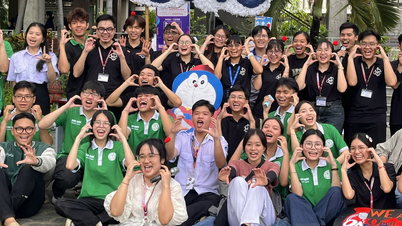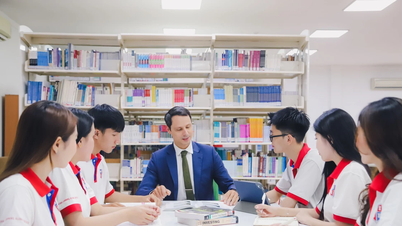Writing the body first, then coming back to the introduction and conclusion is the way to help Dong Hoan increase one point in his Writing skill, achieving 9.0 IELTS overall.
Hoang Dong Hoan, 26 years old, a freelance teacher, achieved 9.0 IELTS on the test day of March 12 on computer in Hanoi .
In particular, Hoan achieved absolute scores in two skills: Reading and Listening, 8.5 in Writing and Speaking. Compared to the last exam three years ago, Hoan increased one point in Writing and 0.5 points in Speaking.

Hoang Dong Hoan, 26 years old, achieved 9.0 IELTS on March 12. Photo: Provided by the character
The former Foreign Trade University student said that the Writing skill is always a challenge for all test takers. In the past, Hoan only focused on vocabulary and grammar, always looking for ways to use difficult vocabulary. But now, the most important thing is to come up with ideas for the writing, according to Hoan.
"Before writing, I will think about which ideas are suitable, which highlights can be exploited and allocate them into sections of the article," Hoan shared.
According to Hoan, the writing process usually consists of two steps. After about ten minutes of thinking, organizing and drafting ideas with basic vocabulary, Hoan finds the appropriate vocabulary and grammar structure to complete the article. The reason is that the writing must first be understood by the reader, then one should consider how to write well.
For Task 1, which requires describing a graph, Dong Hoan often pays attention to the amount of data to find a solution. If there is a lot of data, or complex data combined together, Hoan prioritizes using simple structures and vocabulary to make the analysis easier to understand. For tasks with less data, Hoan often writes a draft and then edits and replaces more difficult vocabulary.
"I don't read sample IELTS essays but read economic articles from some foreign newspapers, through which I learn how to use words and filter out good structures," Hoan said. "This helps me master writing in a foreign style, avoiding Vietnamese-English translations, which lose their naturalness."
For Task 2, Hoan said that his way of doing the test was "opposite" to the majority of candidates. He wrote the body first, analyzed the ideas in detail, then came back to write the introduction and conclusion. Hoan said that this way the introduction would clearly express his point of view, and the conclusion would be consistent with the ideas presented.
"By writing the details first, I can generalize them and put them in the beginning. It allows me to show consistency and create cohesion throughout," Hoan added.
In the body of the essay, Hoan commented that it is better to limit the specific subject if the topic is too general. The topic he received on the exam day was "In today's world, technology is very developed but artists are still respected. So, how does art help life that science and technology cannot?".
According to Hoan, neuroscience cannot describe true emotions and modern language models are not capable of expressing natural, creative language like humans. Here, Hoan limits "technology" to "neuroscience" and "language models", and "artist" limits it to how the author describes "emotions" and "expresses words".
In addition, Hoan writes each idea in a paragraph, focusing on going deeper instead of including many ideas in the same paragraph as before. He considers this a big change in his writing style, after referring to the IELTS scoring criteria table updated mid-last year. Specifically, this table has added the keyword "in depth" in the 9-point scale, different from before.
"I think the examiner requires candidates to know how to turn a general question into an in-depth analysis of a problem and in a specific field," he speculated, saying that it is necessary to cultivate background knowledge to do this.
In addition, Hoan commented that candidates with a score of 6-6.5 are often deducted points for making mistakes in writing long essays. He advised candidates to write under 300 words, practice cutting long essays into short essays to increase the connection in grammar and ideas, creating coherence.
In Speaking, Dong Hoan admits that he doesn't have much experience in reviewing. Usually, he tries to condense ideas, not using many phrases and idioms.
“For example, I look to see if there is another way to express an idea in five words, instead of 10 words, or shorter,” he says.
For the remaining two skills, Listening and Reading, Hoan emphasizes the need to practice daily, even if it only takes 10-15 minutes. He often watches Youtube and reads English newspapers.
Hoan also focuses on understanding how words are used in a foreigner's mind, distinguishing between spoken and written language. "Vietnamese writing is different from English. If possible, ask a native speaker to check your writing and speaking," Dong Hoan said.
Doan Hung
Source link


![[Photo] The 1st Congress of Phu Tho Provincial Party Committee, term 2025-2030](https://vphoto.vietnam.vn/thumb/1200x675/vietnam/resource/IMAGE/2025/9/30/1507da06216649bba8a1ce6251816820)

![[Photo] Panorama of the cable-stayed bridge, the final bottleneck of the Ben Luc-Long Thanh expressway](https://vphoto.vietnam.vn/thumb/1200x675/vietnam/resource/IMAGE/2025/9/30/391fdf21025541d6b2f092e49a17243f)
![[Photo] President Luong Cuong receives President of the Cuban National Assembly Esteban Lazo Hernandez](https://vphoto.vietnam.vn/thumb/1200x675/vietnam/resource/IMAGE/2025/9/30/4d38932911c24f6ea1936252bd5427fa)
![[Photo] General Secretary To Lam, Secretary of the Central Military Commission attends the 12th Party Congress of the Army](https://vphoto.vietnam.vn/thumb/1200x675/vietnam/resource/IMAGE/2025/9/30/9b63aaa37ddb472ead84e3870a8ae825)
![[Photo] Solemn opening of the 12th Military Party Congress for the 2025-2030 term](https://vphoto.vietnam.vn/thumb/1200x675/vietnam/resource/IMAGE/2025/9/30/2cd383b3130d41a1a4b5ace0d5eb989d)































































































Comment (0)